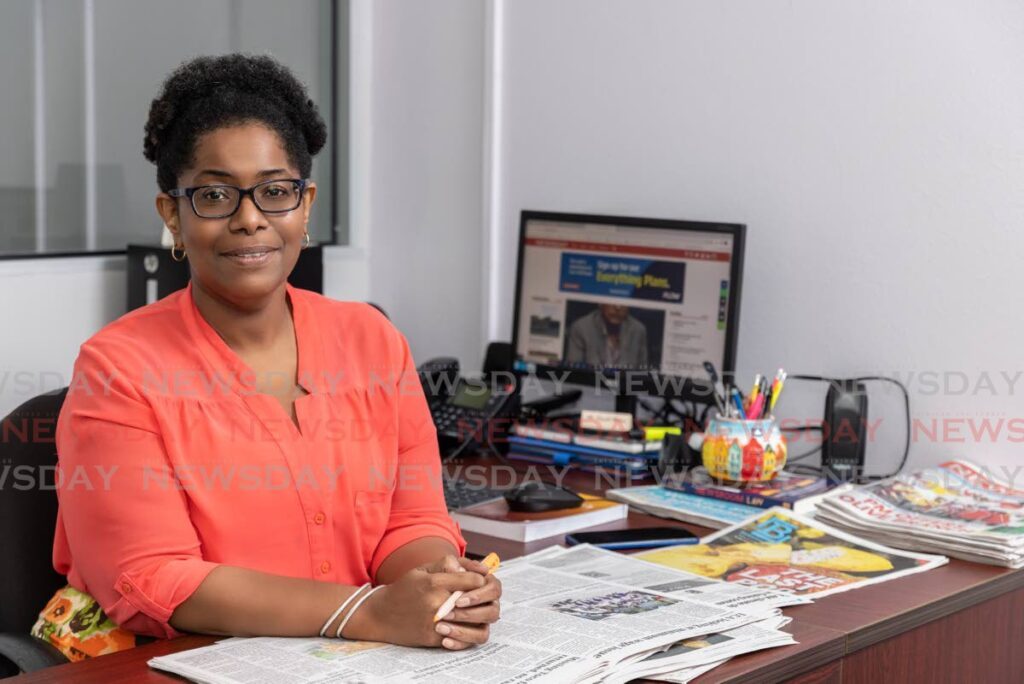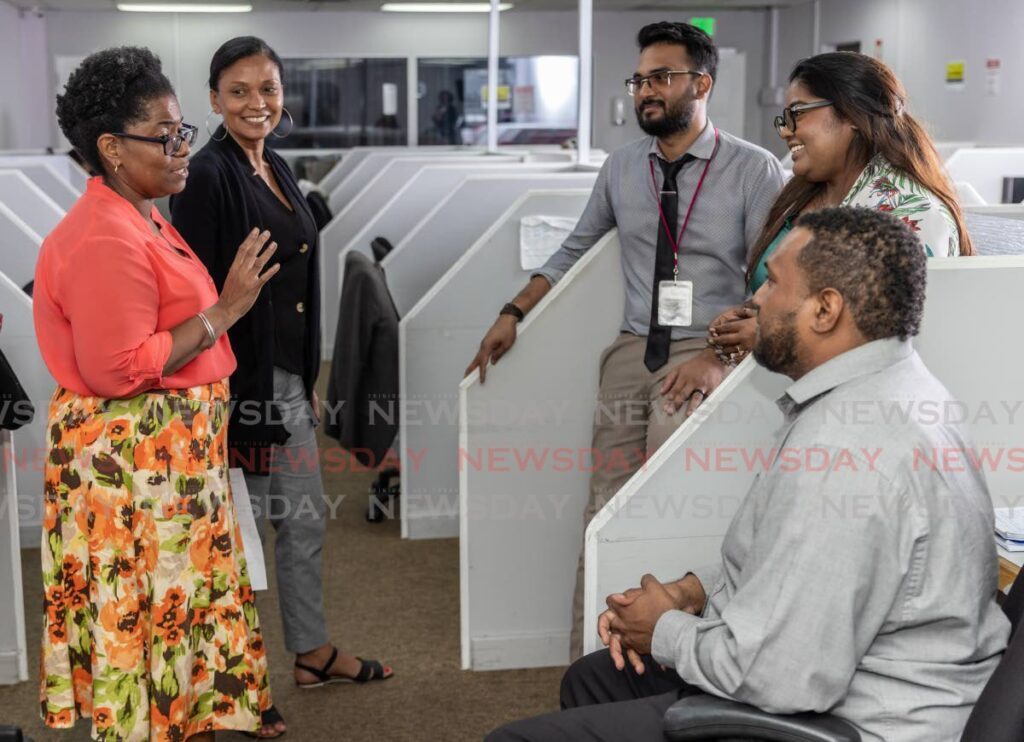Newsday's editor-in-chief leads from within the newsroom

BAVINA SOOKDEO
In the realm of journalism, there are individuals whose dedication and passion serve as beacons of inspiration for aspiring reporters and editors.
Camille Moreno, the editor-in-chief of Newsday, is undeniably one of them.
As Newsday marks its 30th anniversary, we sat down with Moreno to gain insights into her journey in the field of journalism and the newspaper’s enduring commitment to journalistic integrity.
A lifelong love for storytelling
At 51, Camille Moreno has spent the majority of her life immersed in the world of journalism.
Her journey began in 1995, but the seeds of her passion were sown earlier. While doing her first degree at UWI, Moreno’s submission to a student programme at the Guild of Undergraduates led her to explore her areas of interest. led her to explore her areas of interest. At the time, her primary interests were education and journalism. Though her academic focus was on English and history, the allure of storytelling and the power of the press drew her closer to journalism.
She grew up in a household where news was a constant presence, so Moreno’s awareness of current events and their impact on society was deeply ingrained. This awareness, combined with her studies and an affinity for the performing arts, shaped her journalistic sensibilities.
She was always drawn to the idea of telling people’s stories and shining a light on important issues, whether cultural, political, or social in nature.
Moreno’s career began with an internship in subediting and layout at the Express, an opportunity that would set the course for her future. She acknowledges the influence of mentors such as Deborah John, Terry Joseph, Lennox Grant, Raoul Pantin, Keith Smith, Earl Best, Della-Ann Stewart, Marlon Miller and Peter Balroop.
From the Express, she ventured to the Guardian, where she developed even further. By the time she left, she had experience as a news editor and a business editor.
With even more enthusiasm to make a positive difference, Moreno eventually landed at Newsday in 2006 as an editor.
“Suzanne Mills (then editor at Newsday) is the one who reached out to me and invited me to join the Newsday,” Moreno said. “I had known her previously, having been on reporting assignments together. I also remembered her from working with an international agency at a diplomatic event, because she was fluent in Spanish.
"Knowing who her mother was (Therese Mills, an illustrious figure in media circles), I jumped at the opportunity of working with Suzanne and her mother.”
Moreno said the impact of Suzanne and Therese Mills on her journalistic odyssey transcends mere words.
“Suzanne was fearless, and it showed in how determined she was to raise and address issues,” said Moreno. “She was also a very good political columnist – and she was fun, too. She loved pan; she created her very own political party in the newsroom called Party Hearty and went all out with printing T-shirts and logos. She really had that kind of energy as an editor-in-chief.
"She was very fearless and demanding and there is nothing wrong with that – that is something I appreciated.
“Her mother may have been the gentler one – but (still) very firm. Around her, I felt like I was sitting at the feet of my elder and just absorbing everything.”
Suzanne Mills’s decision-making acumen was often the subject of scrutiny, with her motives sometimes shrouded in mystery to many. Through it all though, she maintained a sense of humour.
“We gained many lessons from her.” Moreno said. “She was an excellent writer – to read anything she wrote, you never felt like you were reading a newspaper, but literary work. She did not have a computer on her desk, and she had excellent penmanship. She had her own breakthroughs and shared her stories.
"I may have had one mentor to start, but the rest was thanks to Suzanne Mills.”
Fondest memories and impactful moments
Throughout her career, Moreno has accumulated a treasure trove of memories, from covering the exhilarating energy of Carnival Tuesday to sombre moments reporting on tragic road fatalities, including those involving children.
One memorable incident was an annual general meeting at Republic Bank, where high-profile individuals like Lawrence Duprey and others from CLICO were discussing important matters on New Year’s Eve. As the world prepared to ring in the new year, Moreno stood there, capturing the unfolding events as a junior reporter. Such experiences, both joyous and sorrowful, have shaped her perspective on the power of journalism.
Among her standout memories is the encounter with former prime minister Basdeo Panday as he gave a fiery response to a journalist’s question. Moreno was there to document the infamous “That’s insulting!” retort, a moment that remains etched in TT’s political history.
The evolution of journalism
Over the past three decades, the field of journalism has undergone significant transformations.
Moreno highlights technology as the most prominent catalyst of change.
Despite these technological advancements, the core principles of journalism, including the commitment to informing, educating, and questioning, have remained steadfast.
She emphasises that Newsday continues to pursue its mission of holding a mirror up to society, irrespective of the challenges posed by evolving media landscapes.

In the digital age, when misinformation and fake news abound, Newsday maintains its commitment to journalistic integrity, accuracy, and impartiality.
Moreno stressed, “We continue to be guided by our core principles, which have been passed on to us, and we continue to guide our reporters, photographers and subs – everyone has a role to play – even those responsible for our digital uploading…they are all aware.”
The editor-in-chief noted that many people still call the newsroom asking for help.
“To start with, they just want someone to just listen to them, and then realistically, if we can help, we do. If we cannot, we try to give suggestions as to where they may be able to get help.
"The fact that they still call tells us that we remain true to these principles. While we must write accurately, it isn’t just about that…we do ensure we fact-check and check again, because that is greatly important, but the onus is on us to give people that direction.”
A vision for Newsday’s future
Looking ahead, Moreno envisions Newsday continuing to embody the principles it was founded on – being independent, credible, and representing the people.
But while the core values remain constant, the means of reaching and engaging the audience will evolve. Newsday will embrace digital platforms and multimedia to connect with a broader audience and adapt to the changing media landscape.
For aspiring journalists, Moreno offers sage advice. She emphasises the importance of maintaining integrity and understanding the commitment and hard work that journalism demands.
“You have to be true to yourself. Clark Kent (Superman) and Brenda Starr – while such characters highlighted the importance of journalism, a lot of people get caught up in the concept of glamour and being popular, especially when you get exposed to celebrities.
"Do not feel that this is something that will make you a star...It is a grind to start – you have to be committed and certainly have your own sense of integrity and be even more mindful (now with social media) of what you are doing, because people will call you out,” she said. “While this may sometimes be fun work, recognise that it is hard work. For those who have come in, because we have done internships, whether they have stayed in journalism or went on to other fields, I hope they can incorporate these elements in them and in what they do.
"If you are going to tell someone’s story, you have a responsibility to them, so you should really not do anything that would cause undue harm or embarrassment to anybody.”
Hope for Newsday and newspapers in TT
Despite the challenges the newspaper industry faces, Moreno sees hope for Newsday and other papers in TT.
She pointed out that people still turn to newspapers for reliable information, and the publication continues to reflect the diverse voices of the nation.
“We recognise that there have been changes – we have been impacted on, like any other industry, by economic changes – but people are still calling us, still holding up our papers at press conferences and are still coming to the newspaper for the facts to help make their own point.
"We reflect everyone – children, teens, youths, the elderly – they are seeing themselves in the paper and it remains more visible. Many people still get their copy of the paper, frame it, document it and more.”
Acknowledging the legacy
Moreno took a moment to recognise the indelible legacy of those who have contributed to Newsday’s growth, including Therese Mills and other colleagues who have left their mark.
“We have to continue to recognise and pay tribute to the start– the foundation,” she said. “Therese Mills (late former editor-in-chief, CEO and chairman) will continue to remain someone that people will constantly recognise and refer to as creating a legacy, not only at Newsday but throughout her entire career, which we can only hope to live up to.
"We have also shared quite a few tears here. We have lost Therese Mills, Nalinee Seelal, Rattan Jadoo, Sureash Cholai, Suzanne Mills and others in several parts of Daily News Ltd (Newsday's parent company). Our condolences: we will never forget them.”
Moreno also paid tribute to the resilience of the newspaper and its staff, who have persevered through challenging times (the covid19 pandemic included).
“Additionally, we truly see ourselves as nationals, so Tobago is an important area for us, and we have done extremely well there, as we have a Tobago paper. We hope to do some more work in terms of our reach there,” she said.
As Newsday celebrates its 30th anniversary, the newspaper stands as a testament to the enduring power of journalism in shaping societies and illuminating the stories of its people.
Under the guidance of editor-in-chief Camille Moreno, Newsday remains committed to its mission, ready to embrace the future while staying true to its founding principles.

Comments
"Newsday’s editor-in-chief leads from within the newsroom"